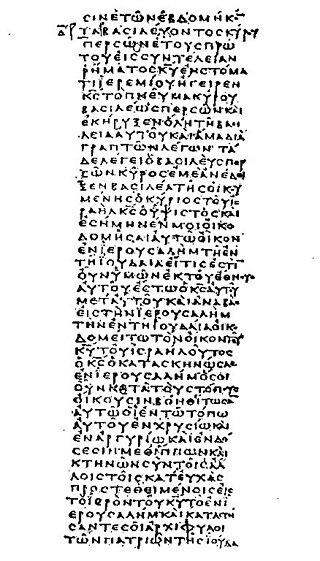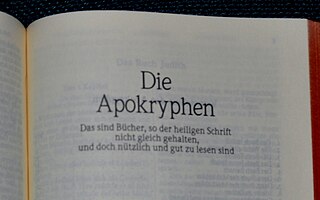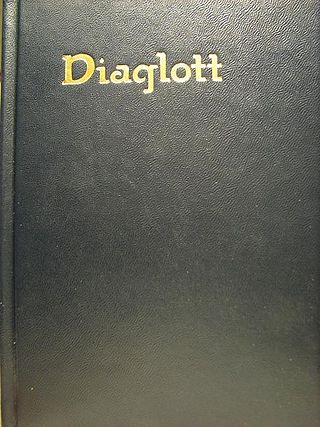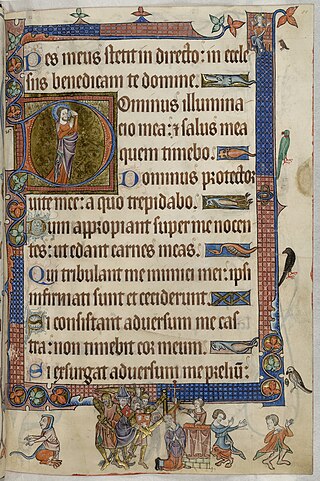Related Research Articles
The Book of Isaiah is the first of the Latter Prophets in the Hebrew Bible and the first of the Major Prophets in the Christian Old Testament. It is identified by a superscription as the words of the 8th-century BCE prophet Isaiah ben Amoz, but there is evidence that much of it was composed during the Babylonian captivity and later. Johann Christoph Döderlein suggested in 1775 that the book contained the works of two prophets separated by more than a century, and Bernhard Duhm originated the view, held as a consensus through most of the 20th century, that the book comprises three separate collections of oracles: Proto-Isaiah, containing the words of the 8th-century BC prophet Isaiah; Deutero-Isaiah, or "the Book of Consolation",, the work of an anonymous 6th-century BCE author writing during the Exile; and Trito-Isaiah, composed after the return from Exile. Isaiah 1–33 promises judgment and restoration for Judah, Jerusalem and the nations, and chapters 34–66 presume that judgment has been pronounced and restoration follows soon. While few scholars today attribute the entire book, or even most of it, to one person, the book's essential unity has become a focus in more recent research.
The Christadelphians are a restorationist and nontrinitarian Christian denomination. The name means 'brothers and sisters in Christ', from the Greek words for Christ (Christos) and brothers (adelphoi).

The King James Version (KJV), also the King James Bible (KJB) and the Authorized Version (AV), is an Early Modern English translation of the Christian Bible for the Church of England, which was commissioned in 1604 and published in 1611, by sponsorship of King James VI and I. The 80 books of the King James Version include 39 books of the Old Testament, 14 books of Apocrypha, and the 27 books of the New Testament.

The Septuagint, sometimes referred to as the Greek Old Testament or The Translation of the Seventy, and often abbreviated as LXX, is the earliest extant Greek translation of the Hebrew Bible from the original Hebrew. The full Greek title derives from the story recorded in the Letter of Aristeas to Philocrates that "the laws of the Jews" were translated into the Greek language at the request of Ptolemy II Philadelphus by seventy-two Hebrew translators—six from each of the Twelve Tribes of Israel.

Vespers is a liturgy of evening prayer, one of the canonical hours in Catholic, Eastern Orthodox, Oriental Orthodox, and Lutheran liturgies. The word for this prayer time comes from the Latin vesper, meaning "evening".
The Ketuvim is the third and final section of the Tanakh, after Torah ("instruction") and Nevi'im ("prophets"). In English translations of the Hebrew Bible, this section is usually titled "Writings" or "Hagiographa".

The Living Bible is a personal paraphrase, not a translation, of the Bible in English by Kenneth N. Taylor and first published in 1971. Taylor used the American Standard Version of 1901 as his base text.

Chapter and verse divisions did not appear in the original texts of Jewish or Christian bibles; such divisions form part of the paratext of the Bible. Since the early 13th century, most copies and editions of the Bible have presented all but the shortest of the scriptural books with divisions into chapters, generally a page or so in length. Since the mid-16th century, editors have further subdivided each chapter into verses – each consisting of a few short lines or of one or more sentences. In the King James Version (KJV) Esther 8:9 is the longest verse and John 11:35 is the shortest. Sometimes a sentence spans more than one verse, as in the case of Ephesians 2:8–9, and sometimes there is more than one sentence in a single verse, as in the case of Genesis 1:2.

A lectionary is a book or listing that contains a collection of scripture readings appointed for Christian or Jewish worship on a given day or occasion. There are sub-types such as a "gospel lectionary" or evangeliary, and an epistolary with the readings from the New Testament Epistles.

The Liturgy of the Hours, Divine Office, or Opus Dei are a set of Catholic prayers comprising the canonical hours, often also referred to as the breviary, of the Latin Church. The Liturgy of the Hours forms the official set of prayers "marking the hours of each day and sanctifying the day with prayer." The term "Liturgy of the Hours" has been retroactively applied to the practices of saying the canonical hours in both the Christian East and West–particularly within the Latin liturgical rites–prior to the Second Vatican Council, and is the official term for the canonical hours promulgated for usage by the Latin Church in 1971. Before 1971, the official form for the Latin Church was the Breviarium Romanum, first published in 1568 with major editions through 1962.

Eugene Hoiland Peterson was an American Presbyterian minister, scholar, theologian, author, and poet. He wrote over 30 books, including the Gold Medallion Book Award–winner The Message: The Bible in Contemporary Language, an idiomatic paraphrasing commentary and translation of the Bible into modern American English using a dynamic equivalence translation approach.
The Testimony is a Bible magazine published monthly by the Christadelphians.

The biblical apocrypha denotes the collection of apocryphal ancient books thought to have been written some time between 200 BC and AD 100. The Catholic, Eastern Orthodox and Oriental Orthodox churches include some or all of the same texts within the body of their version of the Old Testament, with Catholics terming them deuterocanonical books. Traditional 80-book Protestant Bibles include fourteen books in an intertestamental section between the Old Testament and New Testament called the Apocrypha, deeming these useful for instruction, but non-canonical. To this date, the Apocrypha are "included in the lectionaries of Anglican and Lutheran Churches". Anabaptists use the Luther Bible, which contains the Apocrypha as intertestamental books; Amish wedding ceremonies include "the retelling of the marriage of Tobias and Sarah in the Apocrypha". Moreover, the Revised Common Lectionary, in use by most mainline Protestants including Methodists and Moravians, lists readings from the Apocrypha in the liturgical calendar, although alternate Old Testament scripture lessons are provided.

The Emphatic Diaglott is a diaglot, or two-language polyglot translation, of the New Testament by Benjamin Wilson, first published in 1864. It is an interlinear translation with the original Greek text and a word-for-word English translation in the left column, and a full English translation in the right column. It is based on the interlinear translation, the renderings of eminent critics, and various readings of the Codex Vaticanus. It includes illustrative and explanatory footnotes, references, and an alphabetical appendix.

The Christadelphian is a Bible magazine published monthly by the Christadelphian Magazine and Publishing Association (CMPA) of Hall Green, Birmingham, England. It states that it is 'A magazine dedicated wholly to the hope of Israel' and, according to the magazine website, it 'reflects the teachings, beliefs and activities of the Christadelphians'.
The Unamended Christadelphians are a "fellowship" within the broader Christadelphian movement worldwide, found only in the United States and Canada. They are, like all Christadelphians, millennialist and non-Trinitarian. The term Unamended Christadelphians is not the formal name of this community but is used informally to identify the grouping since a statement of faith traditionally used by many in this community is the "Unamended Statement of Faith". Similarly, most of the much larger grouping of Amended Christadelphians traditionally use a statement of faith that has been amended and therefore, in North America is known by the prefix "Amended". Nevertheless, Christadelphians worldwide and both Amended and Unamended Christadelphians in North America share fundamentally the same doctrines, with a few exceptions.

Robert Roberts is the man generally considered to have continued the work of organising and establishing the Christadelphian movement founded by Dr. John Thomas. He was a prolific author and the editor of The Christadelphian magazine from 1864 to 1898.
The Berean Christadelphians are a Christian denomination.
Quiet time, also stated as heart-to-heart time, or one-on-one time with the creator, is a regular individual session of Christian spiritual activities, such as prayer, private meditation, contemplation, worship of God or study of the Bible. The term "quiet time" or "sacred time" is used by 20th-century Protestants, mostly evangelical Christians. It is also called "personal Bible study" or "personal devotions". Rick Warren points out that it has also been called "morning watch" and "appointment with God".

Psalm 27 is the 27th psalm of the Book of Psalms, beginning in English in the King James Version: "The LORD is my light and my salvation; whom shall I fear?". The Book of Psalms is part of the third section of the Hebrew Bible, and a book of the Christian Old Testament. In the slightly different numbering system used in the Greek Septuagint and Latin Vulgate translations of the Bible, this psalm is Psalm 26. In Latin, it is known as "Dominus illuminatio mea".
References
- ↑ "Daily Bible Reading Exhortations" . Retrieved 2007-03-29.
- ↑ Roberts, Robert (1894). My Days and My Ways. Birmingham: CMPA. p. 15.
- ↑ "Welcome to DailyReadings.org.uk" . Retrieved 2020-03-03.